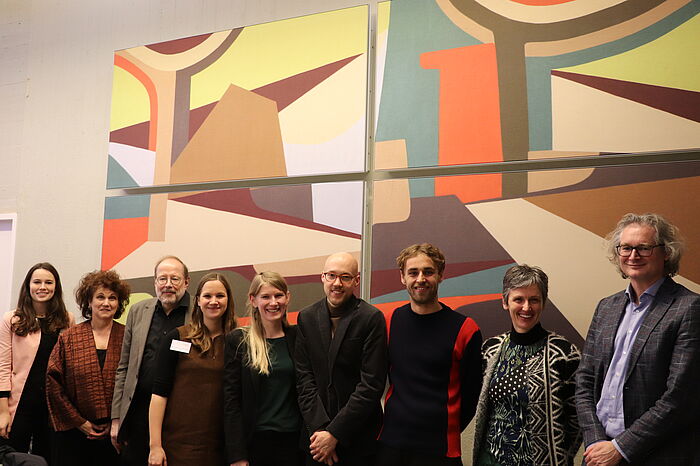- The Institute
- Research
- Dictatorships in the 20th Century
- Democracies and their Historical Self-Perceptions
- Transformations in Most Recent History
- International and Transnational Relations
- Edited Source Collections
- Dissertation Projects
- Completed Projects
- Dokumentation Obersalzberg
- Center for Holocaust Studies
- Berlin Center for Cold War Studies
- Publications
- Vierteljahrshefte
- The Archives
- Library
- Center for Holocaust Studies
- News
- Dates
- Press
- Recent Publications
- News from the Institute
- Topics
- Reordering Yugoslavia, Rethinking Europe
- Munich 1972
- Confronting Decline
- Digital Contemporary History
- Transportation in Germany
- German Federal Chancellery
- Democratic Culture and the Nazi Past
- The History of the Treuhandanstalt
- Foreign Policy Documentation (AAPD)
- Dokumentation Obersalzberg
- Hitler, Mein Kampf. A Critical Edition
- "Man hört, man spricht"
„Man hört, man spricht“
Tagungstelegramm: INFOCOM Workshop I “Informal Communication in Nazi Europe: Ideas – Approaches – Perspectives”

***English below***
Der erste Workshop des Leibniz Junior Research Group Projects „‚Man hört, man spricht‘: Informal Communication and Information ‚From Below‘ in Nazi Europe“ (INFOCOM) fand am 23. und 24. Januar 2020 statt und wurde von Caroline Mezger, Leiterin des INFOCOM-Projektes, und Felix Berge gemeinsam mit Chantal Hambeck organisiert. Ziel war es, das Projektteam, IfZ-Forscherinnen und -Forscher sowie die internationalen Kooperationspartnerinnen und -partner des Projektes zusammenzubringen, um die theoretischen, methodologischen und historiographischen Ideen, Fragen und Herausforderungen von INFOCOM gemeinsam zu diskutieren.
Nach einer Einführung durch Martina Steber, stellvertretende Leiterin der IfZ-Forschungsabteilung in München, stellte Caroline Mezger einen Projekt-Überblick vor und betonte die Potenziale einer komparativen und interdisziplinären Erforschung von (informeller) Kommunikation, Gewalt und Nationalsozialismus im Kontext des Zweiten Weltkriegs. Dabei verknüpfte sie die Grundfragen des Projektes auch mit aktuellen Diskursen um „Fake-News“ und Postfaktizität. In der anschließenden produktiven und offengehaltenen Auftaktdebatte diskutierten die IfZ-Forscherinnen und -Forscher des INFOCOM-Projektes gemeinsam mit den Kooperationspartnerinnen und –partnern die analytischen Begriffe – beispielsweise das Gerücht – und die kursorischen Leitfragen der Interaktion von staatlich-gelenkter Kommunikation „von oben“ und der Produktion, Verarbeitung und Interpretation informeller Informationen „von unten“.
Die vier "INFOCOM"-Teilprojekte stellten sich vor
Daran knüpften auch die Präsentationen und anschließenden Diskussionen der individuellen Teilprojekte an: Felix Berge stellte die Ideen seines Promotionsprojekts vor und verband in seinem Vortrag „Rumors in Nazi Germany: Constructions and Contexts of Informal Communication“ die theoretischen Fragen mit zwei exemplarischen Fallstudien. Izabela Paszko diskutierte anthropologische Konzepte und methodologische Zugänge einer Studie zu „Humor, Rumors and Other Indirect Informal Ways of Communication during the Holocaust in Poland“. Manuel Mork präsentierte einen innovativen Zugang zu informeller Kommunikation im Besatzungskontext seines Forschungsprojektes „The Battle of the Whispers: Government Control and Subversive Instrumentalization of Political Rumor in Occupied France (1940-44)“. Abschließend folgte ein differenzierter Vortrag von Caroline Mezger zu ihrem Habilitationsprojekt „Rumor and Displacement: A History of Forced Migration under the Third Reich, 1938-1948“. Dabei betonte sie die transnationale Perspektive des Themas und diskutierte, gestützt auf Archivrecherchen, als Fallstudie die „Option“ 1939 in Südtirol, die auch ein „Vorspiel“ späterer Vertreibungspolitiken des NS-Regimes war.
Das INFOCOM-Team bedankt sich bei allen Kooperationspartnerinnen und -partnern des Projektes für die produktive Diskussion und die ertragreichen Anregungen zur Gesamtkonzeption sowie den individuellen Teilprojekten. Anwesend waren: Prof. Dr. Ulf Brunnbauer (Leibniz-Institut für Ost- und Südosteuropaforschung, IOS), Prof. Dr. Jan Grabowski (Polish Center for Holocaust Research), Dr. Stefan Martens (Deutsches Historisches Institut Paris), Prof. Dr. Roberta Pergher (Indiana University) und Prof. Dr. Marsha Siefert (Central European University). Der nächste INFOCOM-Workshop findet voraussichtlich 2021 an der Central European University statt.
INFOCOM Workshop I “Informal Communication in Nazi Europe: Ideas – Approaches – Perspectives”
Between January 23 and 24, 2020, the first workshop of the Leibniz Junior Research Group Project “‘Man hört, man spricht’: Informal Communication and Information ‘From Below’ in Nazi Europe” (INFOCOM) was held at the Leibniz Institute for Contemporary History (IfZ) in Munich. Organized by Caroline Mezger, Project Leader of INFOCOM, and Felix Berge, the workshop brought together the project’s team members, researchers of the IfZ, and the project’s international network of cooperation partners to present and discuss INFOCOM’s theoretical, methodological, and historiographical perspectives.
Following a brief opening address by Martina Steber (IfZ), Deputy Head of the Munich Research Department, Caroline Mezger presented an overview of the INFOCOM Project’s genesis and research agenda, situating the project at the confluence of current debates on “fake news” and post-factuality, and interdisciplinary approaches to the histories of (informal) communication, violence, National Socialism, and World War II. A fruitful debate on the project’s research questions and analytic framework ensued, during which the attending cooperation partners and researchers shared invaluable insight from their own areas of expertise.
The rest of the workshop was dedicated to a presentation and discussion of the individual subprojects. Felix Berge introduced his initial doctoral research on “Rumors in Nazi Germany: Constructions and Contexts of Informal Communication” on the basis of two original case studies. Izabela Paszko provided key social anthropological insight with her project presentation “Humor, Rumors and Other Indirect Informal Ways of Communication during the Holocaust in Poland". Manuel Mork presented an overview of his envisioned innovative research into “The Battle of the Whispers: Government Control and Subversive Instrumentalization of Political Rumor in Occupied France (1940-44)". Finally, Caroline Mezger gave a more elaborate lecture on her project “Rumor and Displacement: A History of Forced Migration under the Third Reich, 1938-1948", based on archival research that she had conducted on the 1939 “Option” in South Tyrol.
The INFOCOM team would like to thank the cooperation partners for their support of the project, their attendance at the workshop, and their constructive contributions to the workshop discussions. In attendance were: Prof. Dr. Ulf Brunnbauer (Leibniz Institute for East and Southeast European Studies, IOS), Prof. Dr. Jan Grabowski (Polish Center for Holocaust Research), Dr. Stefan Martens (German Historical Institute Paris), Prof. Dr. Roberta Pergher (Indiana University), and Prof. Dr. Marsha Siefert (Central European University). The next INFOCOM workshop will take place at Central European University and is planned for 2021.



